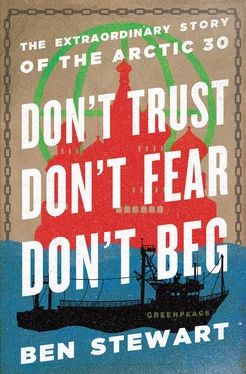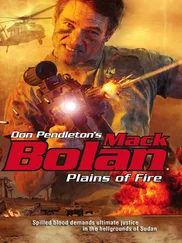‘Which cell are you in?’
‘Two-sixteen.’
‘I’m in two-fifteen! We’re next to each other!’
‘Maybe we can talk.’
And right there, on that first morning in SIZO-1, they devise a code. They agree to tap spoons on the pipe that connects their cells. One tap is ‘A’, two taps ‘B’, three for ‘C’, twenty-six taps for ‘Z’. Five taps mean you want to speak, three means okay, go ahead. And an hour later, when they’re back in their cells, they have their first coded conversation. Then at 10 p.m., when the stamping starts again, when she hears the screams of the other prisoners, Alex taps to Camila and gets a tap back. And that’s how they reassure each other. That’s how they know they’ll survive the second night.
The women have heard nothing of the doroga – the road. They have no cellmates to initiate them into the rituals of this place. Meanwhile the men exchange dozens of emails with each other. Kieron discovers he can get a message to almost any cell in the prison. But mostly he exchanges letters with Phil. They discuss rumours they’re hearing from the others, how some of the activists are saying this will be over in a few days or a few weeks. But even then Kieron’s thinking, no, I can’t cope with this, I can’t do a few weeks in here.
The hours stretch out in a monotonous routine that takes just a single weekend to become familiar. Porridge arrives at six. You eat it then go back to sleep. At eight the guards come into your cell, you put your arms in the air and they frisk you. Then the guards take you out of the cell and stand you in the corridor with your hands against the wall. A guard wipes his palms down your trousers while another guard searches your cell. When the search is over you’re pushed back into your cell and the rest of the morning is yours until the guard comes back and says ‘ Gulyat ’ and you say ‘ Da ’. Then you put your coat on and off you go to the exercise box.
Phil walks there in his boots without laces, shuffling beside a guard, with the camera card under his heel. Then he comes back and spends the afternoon lying on his bunk or staring through the window at the basketball court below. All weekend he sees just one person down there. It’s a child. A young boy. The guards say it’s the son of one of the women prisoners. He’s out there, bouncing a ball, alone.
In the town of Irvington on the outskirts of New York City, 73-year-old Pavel Litvinov is sitting at the desk in his study, scrolling through Facebook, when he sees a status update saying his son has been jailed. It’s nearly forty years since Pavel left Moscow on a train to Vienna with his wife and children, expelled by the KGB. And now Dima is back in Russia, and in prison.
Pavel’s life in America has been comfortable. He thought the dramas of his youth under the Soviet system were behind him. After his expulsion in 1973 he took a job as a physics and mathematics teacher at a prep school, eventually retiring seven years ago. And he still looks like a teacher. He has a bald pate, wears check shirts and a cloth cap and speaks English with a strong Russian accent, despite living more than half his life in the USA.
Now Facebook is telling him that Dima just appeared before the Leninsky Court in Murmansk. The case was postponed from Thursday but today it was quickly dispatched. The judge told Dima he would be jailed for at least two months while an investigation into piracy continues.
‘And I was devastated. I was just so scared and so upset. I already knew Dima was there on the ship but I didn’t know the details, I didn’t know how far he’d got. I was in deep fear and depression. When Dima was jailed my reaction was almost irrational. I gradually pulled myself together, but initially my reaction was fear. I felt I’d taken Dima and his sister out of that country and it would never touch them again in a scary way. So it was just terrible. I called Human Rights Watch and Amnesty International, then I called my local congressman. I was probably more scared than anything, because I thought that at this time the Russian regime was going back to the Soviet ways, and Dima is going to be in a position where this rollercoaster will come down and crush him.’
Pavel doesn’t know it, but last night a documentary was broadcast on the Russian national television station NTV, which is owned by Gazprom. Called Under the Green Roof , it made a series of outrageous claims against Greenpeace. The same station previously broadcast a controversial programme smearing the Pussy Riot protesters. Now Pavel’s son is getting the same treatment.
The documentary claimed Greenpeace is a tool of the American government, that the organisation has been bribed by Western oil companies to ignore their polluting activities, that Greenpeace stayed silent during the Deepwater Horizon disaster and never criticises Exxon – the American oil giant. The programme claimed Greenpeace forged footage of seals and kangaroos being abused, and is banned in Canada because it’s labelled an extremist organisation. The documentary ended with the claim that Greenpeace is controlled by international financiers and banking clans.
After Dima’s court appearance comes Sini Saarela – the Finnish climber who scaled the Prirazlomnaya . She stands in the cage and addresses the judge. ‘I am an honest person,’ she says. ‘I am always ready to take responsibility for what I have done. I am not a pirate. Drilling for oil in ice is a tremendous threat to the environment in Russia and across the Arctic.’ But the judge is unmoved. She gets two months. Next comes Frank, then five others. They’re all told they’re going to jail.
The activists are loaded into an avtozak transport van outside the courthouse. It’s late, they can just about make out the bleak Soviet architecture as they’re driven through the city. They hear gates opening, people screaming and shouting in Russian. The van stops and waits. It moves again. Then it stops and the doors are flung open.
‘Go! Get out get out get out! Welcome to your new home! A step to the left is considered an escape attempt, a step to the right is considered an escape attempt. Move, get out get out get out!’
Dima throws his huge pink bag over his shoulder, steps out and looks up. And this is so incredibly familiar to him. He knows this. He knows this order. A step to the right or a step to the left is considered an escape attempt . He’s read this in so many books; he’s read this so many times in Solzhenitsyn and the other prison camp novels he was brought up on. This feels natural. Like fate. Unavoidable. At some point he had to be in prison in the country of his birth. There’s a Russian saying – ot turmy da ot sumy ne zarekaysya . ‘Don’t swear you’ll never go to prison.’ But Dima knows too much about places like this, there’s too much in his blood. He was always going to end up here.
‘Welcome to your new home.’
Yes, thinks Dima. I’m coming home.
Many a man thinks he’s shifted the course of human history from an English public house, but Maxim Litvinov actually did.
The year was 1907 and the place was a dockers’ pub in the East End of London. The Fifth Congress of the Russian Social Democratic Labour Party – one of whose leaders was Vladimir Lenin – was being held in a nearby church. Also there was Lev Bronshtein, who’d arrived in England after escaping from a Siberian prison and travelling 400 miles across frozen tundra on a sleigh pulled by reindeer. He was known to his comrades as Trotsky.
Maxim Litvinov was staying in a sixpence-a-night dosshouse with his friend, the Georgian revolutionary Josef Dzhugashvili. By day they attended the Congress together, listening to speeches and debating the party’s strategy for overthrowing the Russian tsar and instigating a communist dictatorship in their homeland. By night they drank.
Читать дальше












